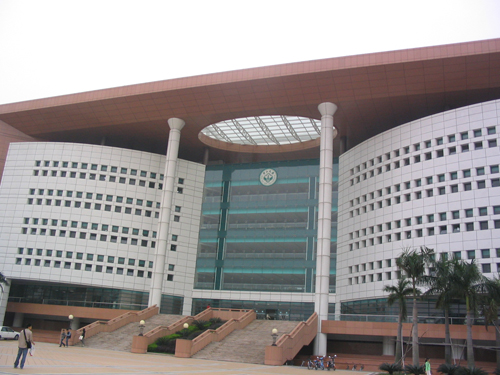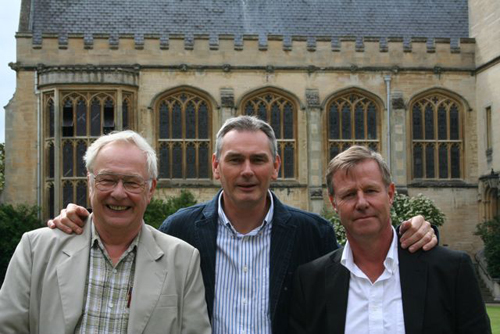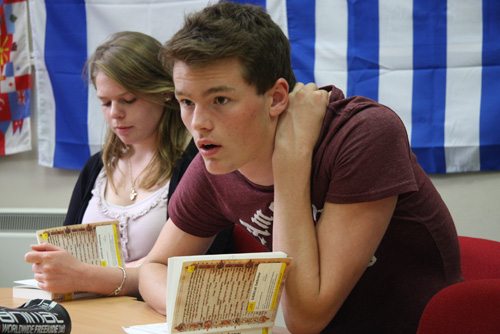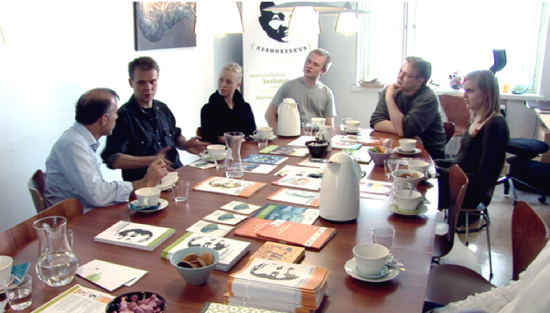
Recesszió. Gazdasági válság. Növekvő versenyprogram. Finnország számára (A Global Search for Education: Nagyobb hangsúlyt Finnország), A sikeres út ebben a helyzetben volt, az oktatás reformja.
The impact of education on individual and national prosperity has long been debated by politicians, policy advisors, business consultants and academics. Azonban, Professor Hugh Lauder explains, “the links between education and a modern economy are much more complex than policy makers would have us believe. Education will no longer be the route to good jobs unless we fundamentally rethink the purpose of education. Rounded students are better suited to the modern economy. If we focused on creativity versus rote learning and exam passing we just might surprise ourselves”.
In an explosive new book, A Global Aukció (Oxford University Press), Lauder and his co-authors, Phillip Brown and David Ashton, show how competition for good middle class jobs just got worse. Increasing worldwide competition leading to cut-priced brain power and a fundamental power shift in favor of corporate bosses and emerging economies are more than ever a threat to the prosperity of middle class Americans. To talk about this issue among other matters in our Globális keresése Oktatás sorozat, I had the honor to chat with Hugh Lauder, Professor of Education and Political Economy, University of Bath, Egyesült Királyság, and Head of Policy and Management Research Group.
Tell me about the background to your book, A Global Aukció.
We had been working on national systems of skill formation for around 14 év. We were travelling the world interviewing policy makers in this area, and then around the turn of the century, we realized the game wasn’t just about national skill systems but also about globalization and what multi-national companies were doing in relation to skills strategies . We were given a grant to interview multi-national executives about their core strategies. These companies were based in Korea, Kína, Szingapúr, Németország, India, az Egyesült Királyságban, and the United States. It very quickly became apparent that many of the assumptions we had been making were being turned over by what was going on in the global economy. We began to understand that executives in these multi-nationals (with the rise of higher education systems in China and India for example) were moving many of the high skill jobs that they had in the west to the east because they could often get the skilled graduates in those countries for a tenth of the price. Many of the assumptions that have been made in the West about globalization have been made on the belief that the ‘head’ work would be done in the West because of our higher education and innovation systems, and that much of the manufacturing work would be done in the East. That was true up to around 2005, but it then changed dramatically. On top of this, multi-national companies were producing what we call digital Taylorism: taking the knowledge in people’s heads and codifying it into computer algorithms so that it becomes working knowledge for companies as a whole. Hogy csökkenti a költségeket a foglalkoztató magasan képzett munkavállalók és nagyon gyakran növeli a sebességet. Például, A NY Times számolt be a közelmúltban, hogy a jogterület, Sok a munkát, ami által végzett jogászok alján véglet, mint például a gyakornokok, most már számítógép végzi. Ez egy példa a digitális taylorizmus. A politikai következménye az, azt hiszem,, az, hogy nem lesz sok diplomások, akiknek törekvéseket és elvárásokat a jó munkát fog megszégyenül. So this raises fundamental questions about the role of education and the role of the economy in Western countries, given that China and India and other emerging economies are not only excelling in manufacturing and services, but are excelling increasingly in the areas of innovation and development.

How does this apply to the UK educational system?
There is a tremendous amount of pressure right now for students to excel in particular tests, and what we are concerned with is the possibility that repeated testing gives them a trained incapacity to think. They don’t have the creative skill required or the interpersonal skills because they are simply learning to take a test. So we have a fundamental concern with the pressure that’s being applied to students through the intensification of the requirement for credentials. Testing and exams have taken too much of a high profile because that takes away from teachers and from students that essential interaction between them that can lead to firing of curiosity, to the development of intrinsic interest, and to a much more creative way of approaching the world.
How do you think we should be assessing students?
It’s a difficult problem. My personal view is that exams are basically selection mechanisms, a way of sorting students, and assessment should be actually about the various ways in which students can be seen to solve problems. This can be through assignments, internships, or practical problems where you can see students working through particular issues. Valóban, many of the multi national companies said that they preferred to have students come in for internships because they could get a much better understanding of those students.
What do you think about the German educational system that directs the majority of young Germans to apprenticeships supplemented by part time schooling?
Unlike many countries in the West, only about 20% of Germans go into higher education. The remainder of the young people have the right to go into an apprenticeship, which is a dual system partly of academic education and partly of applied learning on the job. This system is efficient because it does not over produce graduates, unlike countries such as Britain and America. A rendszer azért jó, mert a gyakornoki van egy erős eleme az általános oktatás köze állampolgárságot.
Mit csináljunk, hogy biztosítsák a lelki egészség diákjaink arca egyre nagyobb nyomás nehezedik?
Sokkal több diák megy kevesebb jól fizetett és érdekes állásokat. Azt hiszem, nehéz csökkenteni a versenyt azok számára munkahelyet. Azt hiszem, meg kell gondolni a vizsgálatok számát a gyerekek vesz. Vannak-e más lehet értékelni a tudományos munka, ahelyett fűznek mindent a vizsgálatok? That’s part of the answer. If you’re talking about your Tiger Mums in New York, you can see why they are doing it, and asking them to slow down is going to be very difficult indeed.
How do you see the role of teachers in improving your education system?
Poor test results have been seen as an indication that we need to improve the quality of teaching in the UK. By and large, teachers understand that they have to go through the motions on these tests, but the ideology of most teachers is much more about trying to create interest and curiosity in children rather than get them through these tests. We are about to change teacher training in this country. We are moving back to an apprenticeship model which looks more like something we had in Victorian times, where instead of universities being the training places for teachers, it’s actually being moved to schools themselves. I think that really good university training plus in-school training is really important to keep teachers in the game and interested. All the evidence still suggests that the key relationship is still between the teacher and the student, and the way in which a teacher can inspire students. Teachers have to be valued. They have to have a special status. I think that is really important.
Solutions from the last chapter of The Global Auction that you would like to share?
Nem az oktatást csak, hogy szervizelési gazdaság. Az oktatásnak, hogy sokkal szélesebb, mint hogy. Azt, hogy az állampolgárságról. Meg kell szólnia inspiráló gyerekeknek arról, hogy a kíváncsiság és a tudományos érdeklődés és a belső motiváció.


In A Global Search for Education, csatlakozzon C.M. Rubin és világhírű szellemi vezetők köztük Sir Michael Barber (UK), DR. Leon Botstein (US), DR. Linda Darling-Hammond (US), DR. Madhav Chavan (India), Professzor Michael Fullan (Kanada), Professzor Howard Gardner (US), Professzor Yvonne Hellman (Hollandiában), Professzor Kristin Helstad (Norvégia), Professzor Rose Hipkins (Új-Zéland), Professzor Cornelia Hoogland (Kanada), Mrs. Chantal Kaufmann (Belgium), Professzor Dominique Lafontaine (Belgium), Professor Hugh Lauder (UK), Professor Ben Levin (Kanada), Professzor Barry McGaw (Ausztrália), Professzor R. Natarajan (India), Sridhar Rajagopalan (India), Sir Ken Robinson (UK), Professzor Pasi Sahlberg (Finnország), Andreas Schleicher (PISA, OECD), DR. David Shaffer (US), Chancellor Stephen Spahn (US), Yves Theze (Lycee Francais US), Professor Charles Ungerleider (Kanada), Professzor Tony Wagner (US), Professzor Dylan Wiliam (UK), Professzor Theo Wubbels (Hollandiában), Professzor Michael Young (UK), és professzor Minxuan Zhang (Kína) mivel azok feltárása a nagy kép oktatási kérdés, hogy minden nemzet ma szembesül. A Global Search Oktatási közösségi oldal
C. M. Rubin a szerző két legolvasottabb internetes sorozat, amely megkapta a 2011 Upton Sinclair díjat, “A Global Search for Education” és “Hogyan fogjuk olvasása?” Ő a szerzője a három bestseller könyv, Beleértve The Real Alice Csodaországban.
Kövesse C. M. Rubin on Twitter: www.twitter.com/@cmrubinworld





Legutóbbi hozzászólások